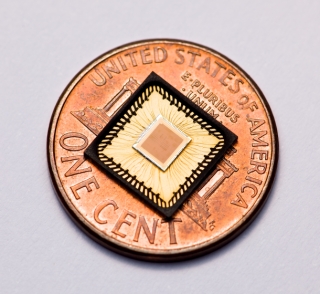Start-up sets sights on probability chip

Start-up Lyric Semiconductor has developed a new chip architecture that promises to speed up the computation of big data applications, such as web search, bid analysis or genome sequencing.
The Massachusetts Institute of Technology (MIT) spin-off said on Tuesday that it is planning to commercialise a type of chip architecture originally developed by its co-founder, Ben Vigoda, while he was a PhD student at the university. The first chips with the technology could roll out within the next 12 months, with a general purpose computing chip on the horizon for testing in 2013, according to Lyric.

Lyric Semiconductor's probability processing technology promises to boost flash memory and data crunching. Credit: Lyric Semiconductor
The chip architecture is designed from the ground-up to handle probability processing, the company said. The probability processing technology calculates in a new way, which could lead to a big jump in processor efficiency, it said.
"Lyric has invented a new kind of logic gate circuit that uses transistors as dimmer switches instead of as on/off switches. These circuits can accept inputs and calculate outputs that are between 0 and 1, directly representing probabilities — levels of certainty," the company said in a statement.
This could have an impact on the many big data applications rely on juggling probabilities to generate results: for example, Google ranks search suggestions according to probability of relevance, and Yahoo uses it to help it filter spam.
"If you think about the most interesting computations today, or the computations that are taking up growing portions of our datacentres, such as fraud detection or bid analysis, a lot of these use probabilities to figure out their answers," Mira Wilczek, director of business development at Lyric, told ZDNet UK.
Lyric is working on a general processor chip — the GP5 — to apply the probability architecture to general computing tasks, the company said. It plans to have a chip available for sampling and testing in 2013. The GP5 is expected to demonstrate 1,000 times the performance of current x86-based processors by Intel and AMD, according to Lyric.
However, to extract major performance gains from the new chip, programs will need to use Lyric's in-house developed code PSBL (Probability Synthesis to Bayesian Logic). Because of this, the first GP5s will be "complete packaged solutions", according to Wilczek, with Lyric programming the chips in-house for specific applications. Over time, Lyric expects businesses to approach it for help with developing programs within PSBL.
The first product to use the technology is an onboard error corrector for flash memory devices that Lyric claims is a twelfth the size and consumes a thirtieth of the power of other error correctors on the market. Named the LEC (Lyric Error Corrector), the technology is available for licence now, and Lyric hopes to see products on the market using it within two years, according to Wilczek.
Lyric chose flash memory for the first commercial offering of the technology because it "wanted to look at an application that was good at probabilities, and that was very well benchmarked", said Wilczek. In addition, the company believes it will serve as a demonstration of the strengths of its approach to the US government. "We can demonstrate a major performance," she added.
Flash memory is the core technology that allows solid-state drives to demonstrate greater speed and accessibility than hard disk drives, but it requires onboard error correctors to compensate for flaws in the way that the data is read. The current generation of flash memory has a broken data rate of one bit in every thousand, but this could fall to one bit in every hundred for newer generations of the technology. The LEC is expected to help correct this.
Lyric has to date received over $20m (£1.3m) in government funding from the Defense Advanced Research Project Agency (Darpa) and other US agencies. It is also backed by venture capital outfit Stata Venture Partners, whose lead partner, Ray Stata, is chairman of the Lyric board.
Executives from Lyric Semiconductor are scheduled to speak at the Flash Memory Summit in Santa Clara, California, on Wednesday and at the International Symposium on Low Power Electronics and Design on Thursday, where they will be talking about the LEC.